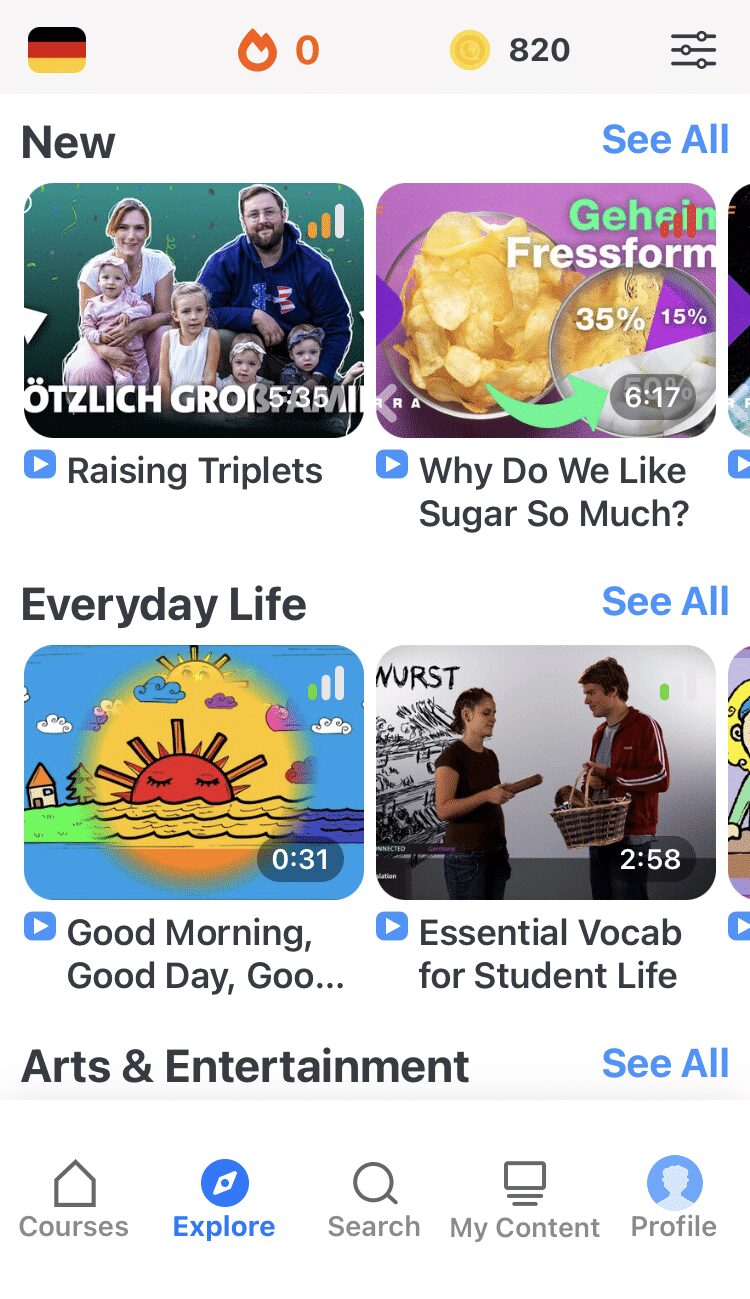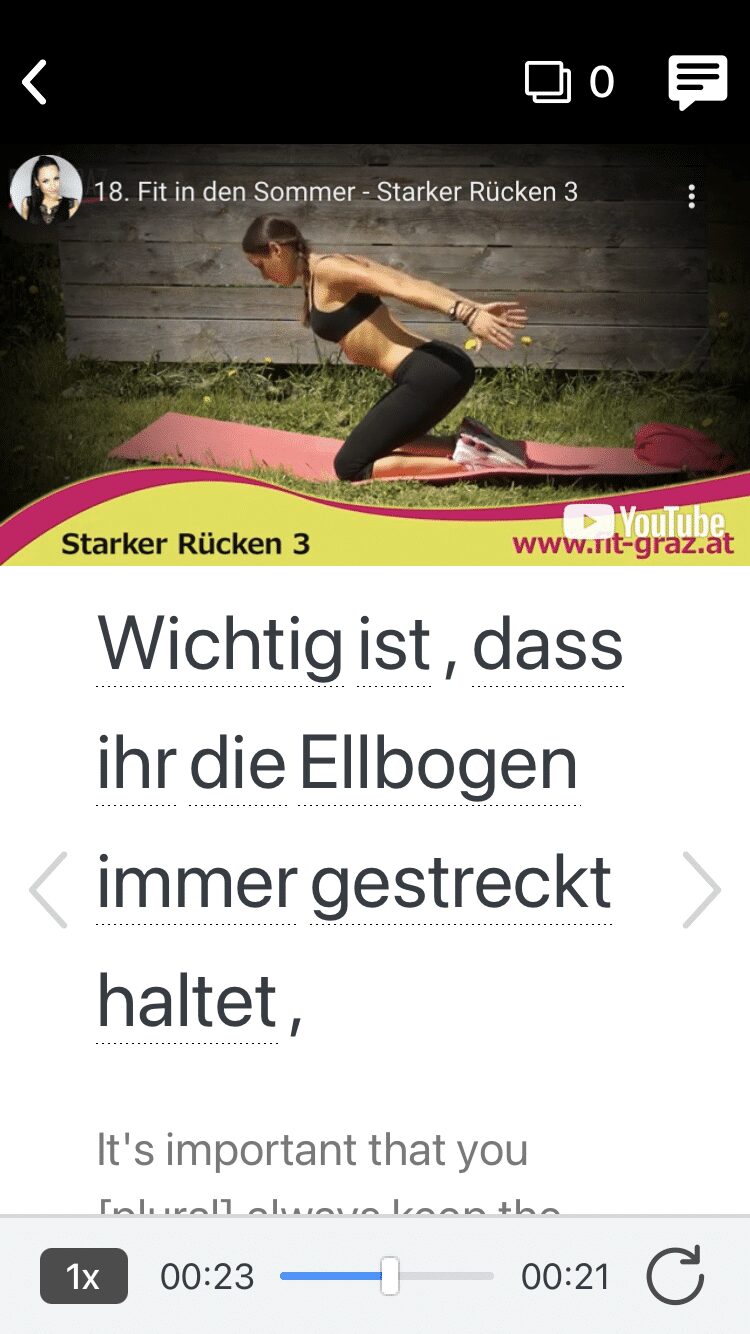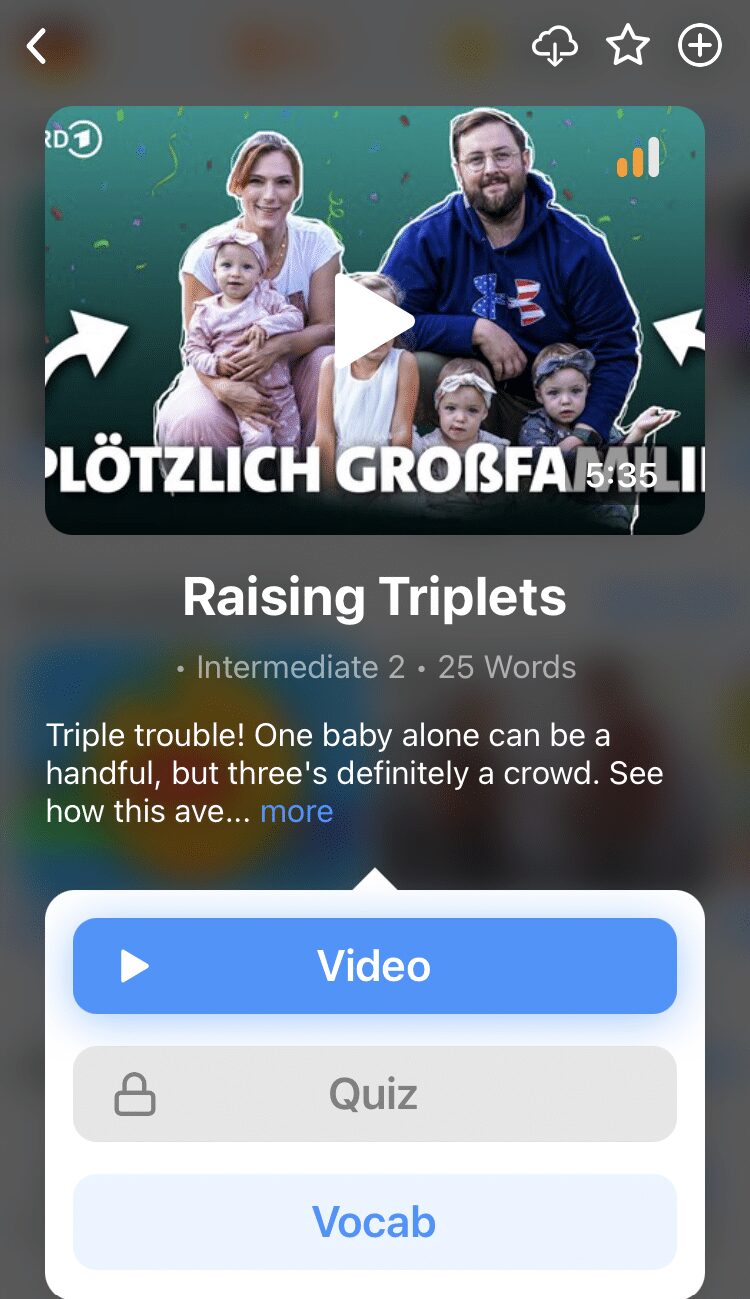30 Best Songs to Learn German

If you learn German with music, your language studies can become that much more fun. Learning German with songs that you’d actually hear in Germany can take it to the next level with the added bonus of impressing your German friends.
Warm up those vocal cords and get ready to sing an eclectic mix of culturally important German songs that native speakers love, from classics to rock, pop and hip-hop hits.
Contents
- 1. “Tour de France” by Kraftwerk
- 2. “99 Luftballons” by Nena
- 3. “Du Hast” by Rammstein
- 4. “Wir Sind Wir” by Paul Van Dyk and Peter Heppner
- 5. “Leider Geil” by Deichkind
- 6. “Eisbär” by Grauzone
- 7. “Zeiten ändern sich” by Bushido
- 8. “Lili Marlene” by Marlene Dietrich
- 9. “Moskau” by Dschinghis Khan
- 10. “Paradies” by Die Toten Hosen
- 11. “Krieger des Lichts” by Silbermond
- 12. “Im freien Fall” by Wirtz
- 13. “Der langsame Tod eines sehr großen Tieres” by Herrenmagazin
- 14. “Eisberg” by Andreas Bourani
- 15. “Dreh dich nicht um” by Gisbert zu Knyphausen
- 16. “Bilder mit Katze” by Frittenbude
- 17. “Wenn ich ein Junge wär” by Fräulein Wunder
- 18. “Männer” by Herbert Grönemeyer
- 19. “Ich bin zu müde, um schlafen zu geh’n” by Hildegard Knef
- 20. “Wenn der Urlaub kommt” by Manfred Krug
- 21. “Cola-Wodka” by Holger Biege
- 22. “Sagen Sie, Frau Zimmermann” by Topsy Küppers
- 23. “Trinklied” by Wir
- 24. “Was du von mir verlangst” by Chicorée
- 25. “Er gehört zu mir” by Marianne Rosenberg
- 26. “Ich will dich” by Kreis
- 27. “Mama will ins Netz” by Annett Louisan
- 28. “Im wunderschönen Monat Mai, Dichterliebe” by Robert Schumann
- 29. “Goldene Insel” by Shirley Thompson
- 30. “Disco King” by Centrum
- Why Learn German with Songs?
Download: This blog post is available as a convenient and portable PDF that you can take anywhere. Click here to get a copy. (Download)
1. “Tour de France” by Kraftwerk
From the celebrated German electronic music band comes this 1983 international hit that portrays the experience of competing in the world’s most famous cycling race, the Tour de France.
In Kraftwerk’s signature style, this song employs repetitive rhythms and a catchy melody with only electronic instrumentation. This electronic music classic notably incorporates mechanical sounds associated with cycling.
This song is perfect for beginners to learn German with music, because it doesn’t have many lyrics yet will teach you quite a lot of vocabulary related to European geography!
2. “99 Luftballons” by Nena
This famous anti-nuclear protest song by the New German Wave band Nena accurately captures the political climate of the Cold War in the 80s in Germany.
It tells a story of how helium balloons are casually released into the air by West German civilians, but are then misconstrued as missiles by East German officials.
This results in an all-out nuclear war, leaving “no room for victors.” This song has easy-to-follow words once you know the lyrics. It is also great for vocabulary if you’re a German history or political science enthusiast!
3. “Du Hast” by Rammstein
Even if industrial metal isn’t your cup of tea, there’s no denying that Rammstein is one of Germany’s most important musical acts, both in the German-speaking world and abroad.
This song, which you might recognize from films like The Matrix and How High, plays with the homophones hast (have) and hasst (hate).
This song has very repetitive and easy lyrics, making it one of the better German songs for learning the language. You can also check out Rammstein’s other music for more useful practice!
4. “Wir Sind Wir” by Paul Van Dyk and Peter Heppner
This song attempts to reflect upon the deep insecurity that Germans were feeling at the turn of the last century. An anthem of hope for the German identity, it is well known to many young Germans.
Given the economic slump of the early 2000s, as well as the reduction of welfare benefits and stagnation of the former East, it aims to highlight that “this is just a bad period” more than any other song of its time.
The lyrics by the renowned Paul van Dyk are powerfully political and great for an intermediate-level German student!
5. “Leider Geil” by Deichkind
Deichkind is one of Germany’s top hip-hop/electro acts, whose ironic and humorous lyrics found popularity in the German-speaking world at the end of the 90s.
This silly song and its equally comical video try to explain, with examples, the concept of leider geil, or “unfortunately awesome.” For example, despite creating pollution and hurting the environment, getting a fancy new ride is leider geil.
The pace of the lyrics, as well as the use of slang, make it more appropriate for a higher-level German language student. Nevertheless, if you like hip-hop, give it a shot!
6. “Eisbär” by Grauzone
Another hit from the German New Wave, this post-punk “cult” song by the Swiss band Grauzone features a man singing about wanting to be a polar bear.
According to him, if he were one, he “wouldn’t have to cry [and] everything would be fine.” Performed with guitars, drums and synthesizers, the song goes on to remark that “polar bears never have to cry.”
The lyrics are ideal for German language beginners who want to acquire some basic, yet specific, vocabulary while they learn German with music that most native speakers recognize!
7. “Zeiten ändern sich” by Bushido
This song by Bushido, a well-known rapper from Berlin, is the type of rap song that glorifies the money and possessions the rapper has accumulated while sneering at his haters, who so clearly underestimated him back in the day.
All that self-involvement produces great examples of reflexive verbs and pronouns! As reflexive verbs have the same object and subject, the lyrics in these kinds of songs are perfect.
For instance, Bushido can now buy himself (sich kaufen) all kinds of things if he wishes, like an entire Lidl grocery store and a villa. Why? Because the times have changed (themselves)—Zeiten ändern sich.
8. “Lili Marlene” by Marlene Dietrich
Though this song has been recorded many times by different singers, Marlene’s recording of the German love song “Lili Marlene” is arguably the most well-known.
Written as a poem in 1915, this song became popular during World War II with soldiers from both sides of the war. This is also probably one of the most famous German-language songs in the world!
With poignant yet colorful lyrics, this ode to Lili Marlene is perfect for intermediate German students who are looking for a challenge as they learn German with music.
9. “Moskau” by Dschinghis Khan
Dschinghis Khan is the poster child for German disco. The band was created in Munich to compete in Eurovision 1979 and released a number of German-language disco tracks centering on hordes and Huns.
“Moskau” has a particularly bright feel. It’s unabashedly fun, and a video of its performance has become Internet famous for featuring dancers in bright, satiny outfits performing outrageous Hopak-style dancing.
The lyrics contain a few interesting verb conjugations, such as the orders in the informal version of the Imperativ case, telling the listener to “wirf die Gläser an die Wand” or “throw the glasses at the wall.”
10. “Paradies” by Die Toten Hosen
Die Toten Hosen is a famous German punk rock band that was formed in Düsseldorf in 1982. The band’s name translates to “The Dead Pants” and it comes from a German idiom.
They’re known for their energetic and socially conscious music, often with humorous and satirical elements. This song’s lyrics convey a sense of longing and reflection, exploring themes of nostalgia and lost opportunities.
The lyrics also feature possessive constructions using the genitive form: Die Hölle der Wiedergeburt (the hell of rebirth), im Buch des Lebens (in the Book of Life) and more.
11. “Krieger des Lichts” by Silbermond
Silbermond gained widespread popularity in the German-speaking music scene in the 2000s with their melodic rock sound and emotionally charged lyrics.
A stirring song in general, the lyrics emphasize the strength within individuals to overcome difficulties and spread positivity. The concept of being a “warrior of light” suggests a commitment to hope, love and resilience.
The lyrics are helpful if you’re studying the imperative form: Lasst uns aufstehen, macht euch auf den Weg, sei wie der Fluß, wenn dein Wille schläft, dann weck ihn wieder (Let us stand up, set out on the way, be like the river, when your will sleeps, wake it up again).
12. “Im freien Fall” by Wirtz
Daniel Wirtz is a German rock musician, singer and songwriter known for his work in the rock and alternative music genres. He was the frontman of the band Sub7even and became famous during the 1990s and 2000s.
In this song, he uses vividly descriptive language, so we can observe how adjective endings change form with different cases. Wirtz employs dative and accusative declension of neutral-gender adjectives.
In the lyrics, Wirtz presents his personal philosophy in reinster Form (in purest form) as he describes das Leben im freien Fall (life in free fall). The song also features a variety of German adverbs.
13. “Der langsame Tod eines sehr großen Tieres” by Herrenmagazin
As the indie rockers from Hamburg paint a dark and abstract picture of dysfunctional love, you can cement in your brain the diverse ways in which prepositions act upon possessive pronouns, articles and adjectives.
The song title translates to “The Slow Death of a Very Large Animal.” This song is full of many luscious German prepositions such as zu, über, unten, in, vor, aus, bei (to, over, under, in, before, out, at).
Also, the lyrics provide examples of imperative form in the second-person plural. The live acoustic version of the song on TV Noir, with a slower tempo and black-and-white aesthetic, is particularly lovely and haunting.
14. “Eisberg” by Andreas Bourani
Andreas Bourani is a German singer-songwriter known for his pop and rock-influenced music. He’s also been a coach on the German edition of the television show “The Voice of Germany.
The lyrics have many examples of the dative state, so you can refer back to it and work out the accusative by elimination if ever confused. Ich treib alleine auf dem Meer (I float alone on the sea) he sings, static state, with the dative particle dem.
If he were to shove a boat into the sea and take off, it would be the directional accusative, (fahre hinaus) auf das Meer, shortened to aufs Meer (I’m sailing out onto the sea).
15. “Dreh dich nicht um” by Gisbert zu Knyphausen
In this song, singer-songwriter Gisbert zu Knyphausen says goodbye to a failing romantic relationship and employs a number of verbs with separable prefixes as he lays out the impending separation.
He says nimm deine Schuhe mit in the lyrics—take your shoes with (you), the imperative form sending the “with” on the front of the infinitive verb mitnehmen (to take with) to the end of the clause.
The same rule returns as he applies the imperative to the verb umdrehen and tells her, dreh dich nicht um (don’t turn around), with his construction based on the verb krummnehmen (take the wrong way) and the imperative nimm sie uns nicht krumm (don’t take it wrongly).
16. “Bilder mit Katze” by Frittenbude
Frittenbude is a German electronic music group formed in 2007. The band’s style combines elements of electro, techno, punk and hip-hop, creating a unique and energetic sound.
This is a catchy electro track with laconic hipster rap vocals to help you remember how subjunctive I (Konjunktiv I) form works with the line of doch sie sei leider pleite (she was supposedly broke, unfortunately).
The lyrics are also packed with adjective declination, past tense verb conjugation, lots of slang and complex narrative lyrics.
17. “Wenn ich ein Junge wär” by Fräulein Wunder
Fräulein Wunder was a German pop-rock band that gained popularity in the late 2000s. This song, called “If I Were A Boy” in German, came out a few months before Beyoncé’s song of the same name came out. Coincidence?
The two songs are still quite different in mood. We hear the subjunctive II (Konjunktiv II), which is the realm of theoretical and far-fetched possibilities.
The lyrics include Ich würd nur D-max gucken, und Jacky-Cola schlucken, ich würd mich selber küssen, und nur zum Spaß freihändig pissen – wenn ich ein Junge wär… (I would watch only D-max, gulp cola, kiss myself and piss with no hands for fun…)
18. “Männer” by Herbert Grönemeyer
This half-satirical, half-Men’s Lib song about men and their nuances is one of the most popular German songs by Herbert Grönemeyer. Grönemeyer is one of the most commercially successful artists in Germany.
Featured in his album 4360 Bochum, the track has tongue-in-cheek lyrics and ironically points out that “men provide security [yet] men cry in secret […] men can do everything [yet] men have heart attacks.”
This catchy classic is perfect for learning German because of its easy vocabulary and Grönemeyer’s clear enunciation. You’ll also learn a song by one of the most famous German singers.
19. “Ich bin zu müde, um schlafen zu geh’n” by Hildegard Knef
It’s hard to pick just one Hildegard Knef track for learning German. Knef is one of Germany’s most famous chanteuses of the 60s and 70s.
This tune, sung in her signature smoky and almost raspy voice, is about how she is “too tired to go to sleep.” She hates silence and calm and loves the clamor and the “pulse of the hasty night.”
The lyrics are perfect for you if you like something more playful or lighthearted. It has the added benefit that you would find most of its vocabulary in an elementary German textbook!
20. “Wenn der Urlaub kommt” by Manfred Krug
Manfred Krug was a versatile and prominent figure in the German entertainment industry, known for his contributions to film, television and music in both East and West Germany.
“Wenn der Urlaub kommt” (“When the Vacation Comes”) is like an afternoon spent at the city park: kind of loud and kind of exciting, with a noisier detour partway through.
Some phrases feature useful grammar. The song can also help cement your understanding of the word “wenn,” as it’s featured heavily throughout. The lyrics are hard to find so you can practice your listening with this one.
21. “Cola-Wodka” by Holger Biege
Similar to our previous singer, Holger Biege was a singer-songwriter originally from East Germany who then built up a career in West Germany.
His songs often have a blend of acoustic elements and melodic pop sounds. In this seemingly upbeat song with a haze of horns, pianos and high-energy drums, he implicates vodka and Coke for his mistakes.
The lyrics include some useful bits of vocabulary that help shift the blame or talk about bad things happening: leider, meaning “unfortunately,” and Cola-Wodka war Schuld daran (vodka and cola were to blame).
22. “Sagen Sie, Frau Zimmermann” by Topsy Küppers
“Sagen Sie, Frau Zimmermann” (Tell Me, Mrs. Zimmerman) features a bold, brassy sound, with crooning ladies pulling out all the stops on background vocals. The storytelling in the lyrics takes center stage.
This tale of a scorned woman is also filled with dark humor—an excellent incentive to translate the lyrics. It sounds like a cheery song, but the lyrics get progressively more sinister.
Learn the repetition of commands such as sagen Sie, or “tell me,” which is the polite imperative. There are many useful verbs such as putzen (to clean), backen (to bake) and lieben (to love).
23. “Trinklied” by Wir
The East German band Wir released some rocking songs. They sit firmly in the camp of funk-rock, with distorted guitars and unusual melodies. They started up in the disco age and played music through the late 80s.
This song, “Trinklied” (“Drinking Song”), is a particularly funky track. The vocals are dreamy at first, building up into harmonized shouts in the chorus (“Trink, trink!”—“Drink, drink!”).
The relatively slow tempo makes for easy listening, and the lyrics are available online.
24. “Was du von mir verlangst” by Chicorée
Chicorée was a rock band from the DDR (the former East Germany) that was reasonably well known during the 80s, and this song (whose title means “What you’re asking of me”) is from 1987.
One of the challenges of learning a new language is figuring out the most natural way to say something. Instead of memorizing set phrases, it’s helpful to find a catchy hook in a song that repeats a phrase—a built-in memory device.
This song features two idiomatic expressions that repeat endlessly: von mir verlangen (to request of me) and etwas macht mir Angst (I’m afraid of something).
25. “Er gehört zu mir” by Marianne Rosenberg
Marianne Rosenberg is known for being a Schlager singer at heart. The German word “Schlager” literally means “hit” and the songs tend to have a certain twangy sound and warm gentleness to the lyrics.
That said, “Er gehört zu mir” (“He Belongs to Me”) is not a Schlager song. It sounds quintessentially disco and the instrumentation isn’t filled with guitars or accordions, but synths and strings.
Given Marianne Rosenberg’s clear enunciation, this is an excellent song for practicing your accent, but even beyond that, the lyrics are filled with immediately useful phrases.
26. “Ich will dich” by Kreis
Kreis’s discography features numerous songs with disco and 70s funk stylings. If you enjoy this melodic track, you’re sure to enjoy others in their rock oeuvre.
With stirrings of strings and flutes in the background, breathy vocals sing out, Ich will dich, ich will dich, nur dich immerzu! (I want you, I want you, only you, forever!).
The tempo of the song is great for beginners, and the repetitive lyrics are catchy and memorable. At the very least, you’ll learn how to say, “I want you” over and over.
27. “Mama will ins Netz” by Annett Louisan
Annett Louisan’s music is characterized by a blend of pop, jazz and chanson influences. Her distinctive voice, combined with thoughtful lyrics, has contributed to her appeal.
In this song, the singer’s mother ventures into the world of computing for the first time, hoping to figure out the process of sending an email. Louisan helps her on the phone, providing instructions.
There are plenty of article declensions in the lyrics. What to do mit der Maus (with the mouse)? Was hast du denn für ‘nen Provider (so what kind of provider do you have)? Mama has no idea. Die Hoffnung stirbt zuletzt (Hope dies last).
28. “Im wunderschönen Monat Mai, Dichterliebe” by Robert Schumann
This is a Lied (“art song”), from the 19th-century genre consisting of setting romantic German poems to music. This piece is the first of 16 movements of Schumann’s longer song cycle, “Dichterliebe” (“The Poet’s Love”).
The lyrics are taken from Heinrich Heine’s Lyrisches Intermezzo (1822). It’s about a knight who sits sorrowfully at home all day, but is visited by a fairy bride at night. The knight dances with her until the morning when she returns him to his “poet’s room.”
Though the vocabulary of the Dichterliebe is a bit advanced, the version above is clearly sung, so you can definitely follow along with the lyrics!
29. “Goldene Insel” by Shirley Thompson
“Goldene Insel” (“Golden Island”), is featured on the album “Funky Fräuleins,” a compilation of funky German songs. Like other tracks on this list, “Goldene Insel” is catchy and poppy.
The lyrics are hard to understand (mentioned in the album’s liner notes), but it’s invaluable to hear German spoken and sung in ways that are different from the standard accent.
Conversing in a new language involves more than just classroom pronunciation, after all.
30. “Disco King” by Centrum
The title of the song says it all: it’s about the king of disco. Simplistic lyrics combine with a funky backing track to make for a short, enjoyable song.
The lyrics aren’t available online, so this is a good opportunity to test your listening comprehension. Its slow pace makes this song especially good for learners who are just starting to work on their listening skills.
There is some fun vocabulary, such as engen Hosen (tight pants), as well as idiomatic turns of phrase, such as the separable verb in und dann geht er los (and then he sets off).
Why Learn German with Songs?
Still not completely sure how listening to music will help you with your language skills? Here are some great reasons for learning German with music.
- Enhanced vocabulary: Songs expose learners to diverse vocabulary, helping expand their German word bank beyond typical textbook phrases and expressions.
- Cultural insight: German music provides a glimpse into the culture, history and societal nuances, making language learning more comprehensive and engaging.
- Pronunciation practice: Mimicking the lyrics helps learners improve pronunciation and rhythm, fostering a more authentic spoken German.
- Contextual learning: Songs often convey emotions, stories and experiences, offering learners a contextual understanding of language usage in various situations.
- Societal slang: Contemporary songs frequently incorporate colloquialisms and slang, providing insight into everyday language usage and making learners sound more natural in conversation.
- Motivational tool: Enjoyable and relatable songs can serve as a motivational tool, making language learning a fun experience and keeping learners motivated over time.
Have we got you rockin’ out to Rammstein or swaying to swoony old-school tunes?
The internet has many more songs and music videos that you can use to keep improving your German, if you know where to look.
You can always browse through lists of German songs on Spotify and try to work out the words’ meaning in context. Another good way to improve your understanding of German grammar, vocabulary and idioms is learning German with song lyrics.
You can also take it a step further and use learning programs to help guide you.
FluentU is one of the best websites and apps for learning German the way native speakers really use it. FluentU takes real-world videos—like music videos, movie trailers, news and inspiring talks—and turns them into personalized language learning lessons.
Watch authentic media to simultaneously immerse yourself in the German language and build an understanding of the German culture.
By using real-life videos, the content is kept fresh and current. Topics cover a lot of ground as you can see here:

Vocabulary and phrases are learned with the help of interactive subtitles and full transcripts.

Hovering over or tapping on any word in the subtitles will automatically pause the video and instantly display its meaning. Interesting words you don’t know yet can be added to a to-learn list for later.

For every lesson, a list of vocabulary is provided for easy reference and bolstered with plenty of examples of how each word is used in a sentence.
Your existing knowledge is tested with the help of adaptive quizzes in which words are learned in context.

To keep things fresh, FluentU keeps track of the words you’re learning and recommends further lessons and videos based on what you've already studied.
This way, you have a truly personalized learning experience.
Start using the FluentU website on your computer or tablet or, better yet, download the FluentU app from the iTunes or Google Play store. Click here to take advantage of our current sale! (Expires at the end of this month.)
Whatever your taste in music is, you’ve now got a killer playlist of classics and hit German songs to help you learn more about the language.
Download: This blog post is available as a convenient and portable PDF that you can take anywhere. Click here to get a copy. (Download)







